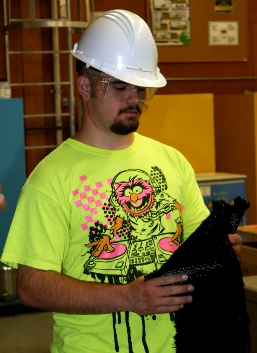Maine UCEDD and Maine EPSCoR Collaborate on Model to Support the Transition of High School Students with Disabilities into STEM-related Postsecondary Education
September 28, 2012

|
| High school student Sam Vigue examines a sample of composite material used in Bridge-in-a-Backpack technology at the University of Maine Advanced Structures & Composites Center. |
The University of Maine Center for Community Inclusion and Disability Studies (ME UCEDD), and Maine EPSCoR (Experimental Program to Stimulate Competitive Research), are collaborating on a project, Increasing Access and Success in the STEM Disciplines, to develop and evaluate a model for supporting the transition of Maine high school students with disabilities into STEM-related postsecondary educational opportunities within the University of Maine System.
As part of a package of evidenced-based supports including student and family-centered planning meetings, training, STEM (Science, Technology, Engineering and Mathematics) career exploration, and mentoring relationships and internships; students in the project recently participated in a day-long exploration of postsecondary STEM opportunities at the University of Maine. Campus visits included the Department of Chemical and Biological Engineering, the Advanced Structures & Composites Center, the Foster Student Innovation Center, and Fogler Library.
Increasing Access and Success in the STEM Disciplines is funded by a National Science Foundation Award EPS-0904155 to Maine EPSCoR at the University of Maine. The project is co-coordinated by Alan Kurtz, Coordinator of Education and Autism; and Janet May, MEd, Coordinator of Transition and Adults.







